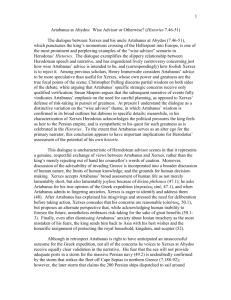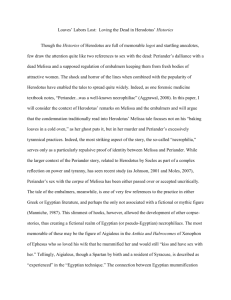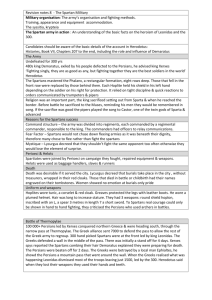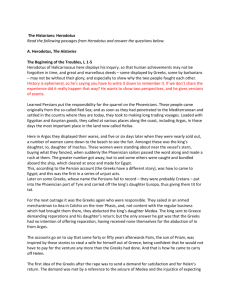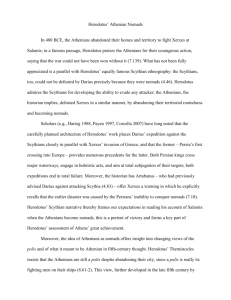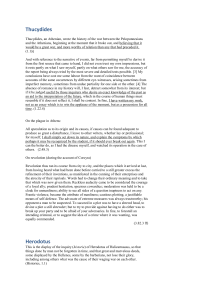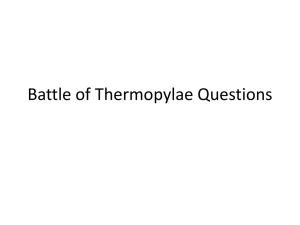Battle of Thermopylae Guided Reading
advertisement
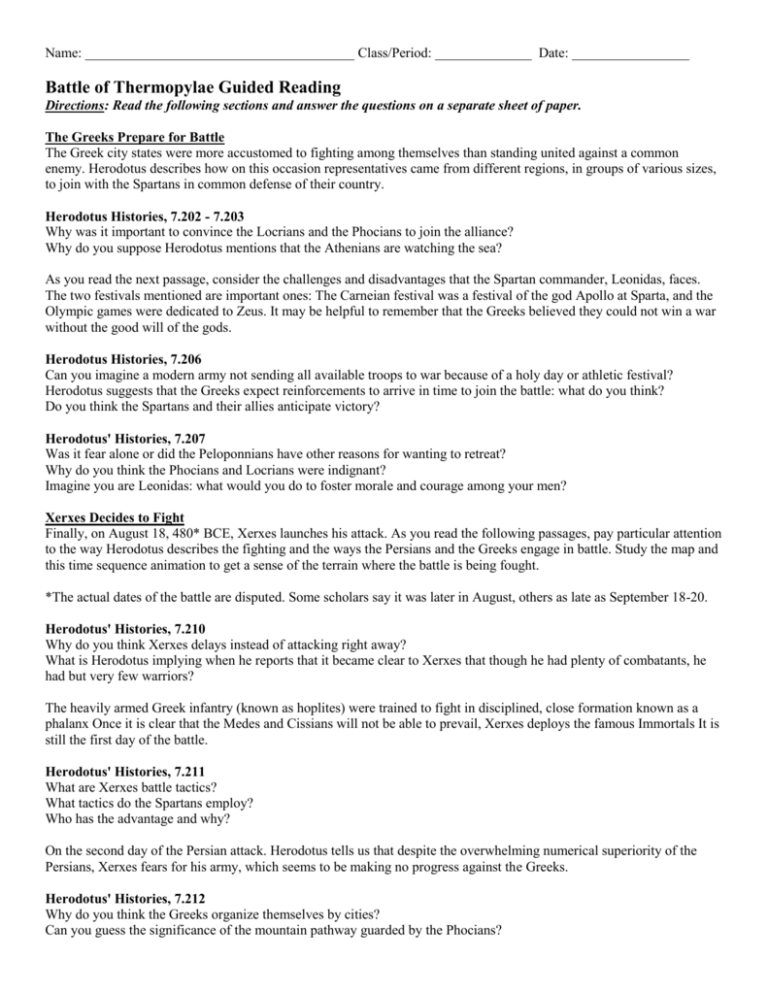
Name: _______________________________________ Class/Period: ______________ Date: _________________ Battle of Thermopylae Guided Reading Directions: Read the following sections and answer the questions on a separate sheet of paper. The Greeks Prepare for Battle The Greek city states were more accustomed to fighting among themselves than standing united against a common enemy. Herodotus describes how on this occasion representatives came from different regions, in groups of various sizes, to join with the Spartans in common defense of their country. Herodotus Histories, 7.202 - 7.203 Why was it important to convince the Locrians and the Phocians to join the alliance? Why do you suppose Herodotus mentions that the Athenians are watching the sea? As you read the next passage, consider the challenges and disadvantages that the Spartan commander, Leonidas, faces. The two festivals mentioned are important ones: The Carneian festival was a festival of the god Apollo at Sparta, and the Olympic games were dedicated to Zeus. It may be helpful to remember that the Greeks believed they could not win a war without the good will of the gods. Herodotus Histories, 7.206 Can you imagine a modern army not sending all available troops to war because of a holy day or athletic festival? Herodotus suggests that the Greeks expect reinforcements to arrive in time to join the battle: what do you think? Do you think the Spartans and their allies anticipate victory? Herodotus' Histories, 7.207 Was it fear alone or did the Peloponnians have other reasons for wanting to retreat? Why do you think the Phocians and Locrians were indignant? Imagine you are Leonidas: what would you do to foster morale and courage among your men? Xerxes Decides to Fight Finally, on August 18, 480* BCE, Xerxes launches his attack. As you read the following passages, pay particular attention to the way Herodotus describes the fighting and the ways the Persians and the Greeks engage in battle. Study the map and this time sequence animation to get a sense of the terrain where the battle is being fought. *The actual dates of the battle are disputed. Some scholars say it was later in August, others as late as September 18-20. Herodotus' Histories, 7.210 Why do you think Xerxes delays instead of attacking right away? What is Herodotus implying when he reports that it became clear to Xerxes that though he had plenty of combatants, he had but very few warriors? The heavily armed Greek infantry (known as hoplites) were trained to fight in disciplined, close formation known as a phalanx Once it is clear that the Medes and Cissians will not be able to prevail, Xerxes deploys the famous Immortals It is still the first day of the battle. Herodotus' Histories, 7.211 What are Xerxes battle tactics? What tactics do the Spartans employ? Who has the advantage and why? On the second day of the Persian attack. Herodotus tells us that despite the overwhelming numerical superiority of the Persians, Xerxes fears for his army, which seems to be making no progress against the Greeks. Herodotus' Histories, 7.212 Why do you think the Greeks organize themselves by cities? Can you guess the significance of the mountain pathway guarded by the Phocians? The Greek forces knew very well that there was one very dangerous weakness in their defense of Thermopylae. Although the mountains protected them on one side and the sea on the other, there was an alternate pathway through the mountains that was well-know among the local Greek inhabitants. Herodotus' Histories, 7.213 – 7.217 Why do you suppose Herodotus takes the time to describe the fate of the traitor Ephialtes? What is the importance of the Phocian’s assignment? A Time of Decision for the Greeks Once they have achieved the mountain pass, the Persians are prepared to sneak up on the Greeks from behind. Meanwhile, various warnings that the end is near filter into the Greek camp. Once again they are faced with a moment of decision. Herodotus' Histories, 7.219 Now Herodotus focuses our attention on Leonidas in this moment of crisis and decision. Try to imagine how you would handle this situation if you were the Spartan commander. Herodotus' Histories, 7.220 Why do you think Herodotus offers so many possible motives for the actions of Leonidas and the Greek allies? What does Leonidas hope to gain from staying? Why would Leonidas believe that the Spartans must remain at Thermopylae? What event does he hope to prevent? Why do you think Herodotus introduces the oracle at this point in the story? The Battle Ends In the end only a much reduced force is left to defend the Hot Gates: the Spartans, the Thespians, and the Thebans. Herodotus' Histories, 7.222-223 Do you think Herodotus favors the heroism of the Greeks? How would you tell the story differently if you were a Persian? Herodotus' Histories, 7.224-225 Why does Herodotus take care to learn the names of all of the 300? What do you think would motivate the Spartans to fight so fiercely over the body of the slain Leonidas? Do you believe such a struggle ever actually took place?
